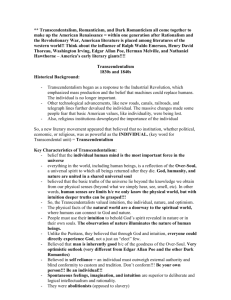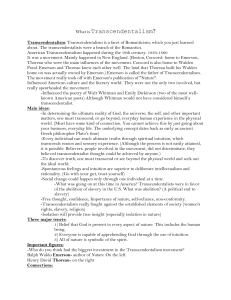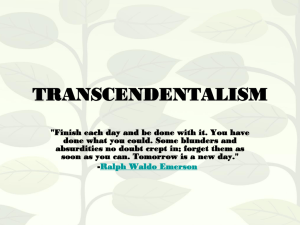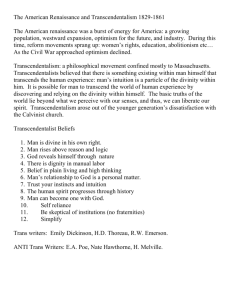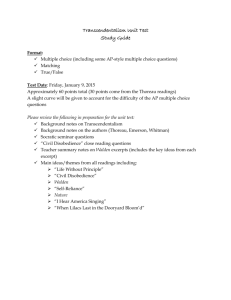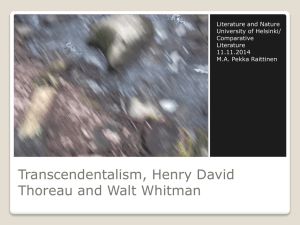Transcendentalism
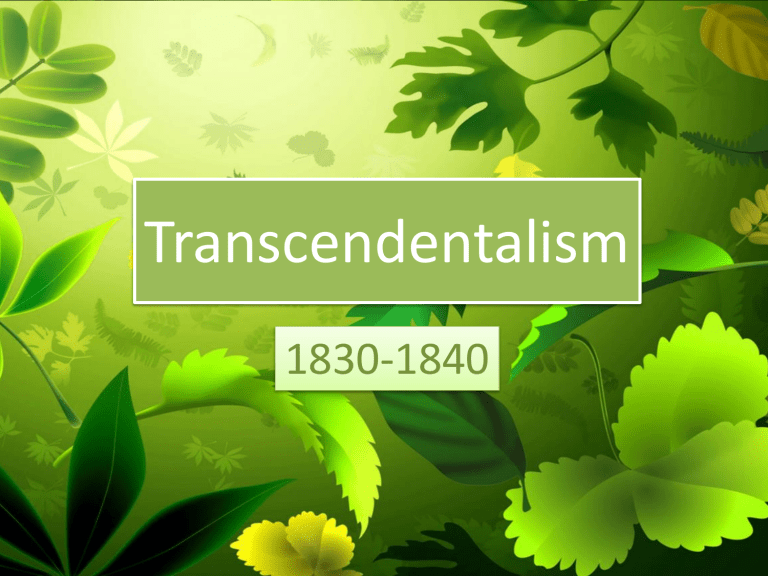
Transcendentalism
1830-1840
Trans – what?!
• The Transcendentalists were a group of New
England writers in the mid-19th century
(1830s and 40s); many were early abolitionists and feminists.
• Transcendentalism is an extreme form of
Romanticism and shares its views of Man,
Nature, God, and Society.
• Transcendentalism is also rooted in
Puritanism.
Romantic Roots
• Placed central importance on emotions and the individual
• Emphasized intuition and inner perception of truth that differs from reason
• Emphasized nature’s beauty, strangeness, and mystery
• Emphasized individual expression and artistic freedom
Puritan Roots
• Belief in God as a powerful force
• Belief that each individual can experience God first-hand
• God gave humankind the gift of intuition
• Gift of insight
• Gift of inspiration
I can pronounce it – now what is it?
• Central Idea of Transcendentalism: The way to truth or ultimate reality is not available to reason, logic, science, or the senses; it is available only through intuition
• Belief in a higher kind of knowledge than that achieved by human reason
Founder
• Ralph Waldo Emerson:
– Chief founder of
Transcendentalism
– Former Unitarian minister
– Lecturer, essayist, and poet
– Known for “Self-Reliance,”
“The American Scholar,” and “The Divinity School
Address”
Protégé
• Henry David Thoreau:
– Emerson’s protégé
– Took Emerson’s theories and put them into practice
– As an experiment, lived for two years at Walden Pond outside of Boston
– Two major works: Walden and Civil Disobedience (in protest of the U.S.Mexican War and the idea of manifest destiny; inspired Ghandi and Martin Luther
King, Jr.)
Walden Pond
Core Tenets
• The individual is paramount.
• Major inspirations included nature and intuition.
• The spiritual is valued over the rational.
• God is present in every aspect of nature, including every human being.
• Everyone is capable of apprehending God through the use of intuition.
• To exemplify the core tenets: From Emerson’s
“Nature”
Basic Beliefs
• Society – corruptive and makes you conform
• Simplicity – keep life simple
• Life – be yourself; don’t imitate; be true
• Education – gateway to everything
• Government – corrupt, but needed
• Love – the one you love matters most
• Nature – beautiful; adds youth; reflection of God
• Over-soul – man, nature, and universe all intertwined
Divine Intellect
• Society is corruptive because under its influence and pressure to conform, man is discouraged and distracted from listening to his Divine Intellect and doing what he knows in his heart to be good.
• Divine Intellect is the idea that all humans possess higher knowledge but not all know or use it
• Unlimited potential of each individual
• Set high goals to improve
Food for Thought
• “According to Emerson, the Human Mind is so
Powerful it can unlock any Mystery, from the
Intricacies of Nature to the Wonder of God.”
• Is the human mind capable of more than many humans require?
• Kyle XY clips
• The God Particle
